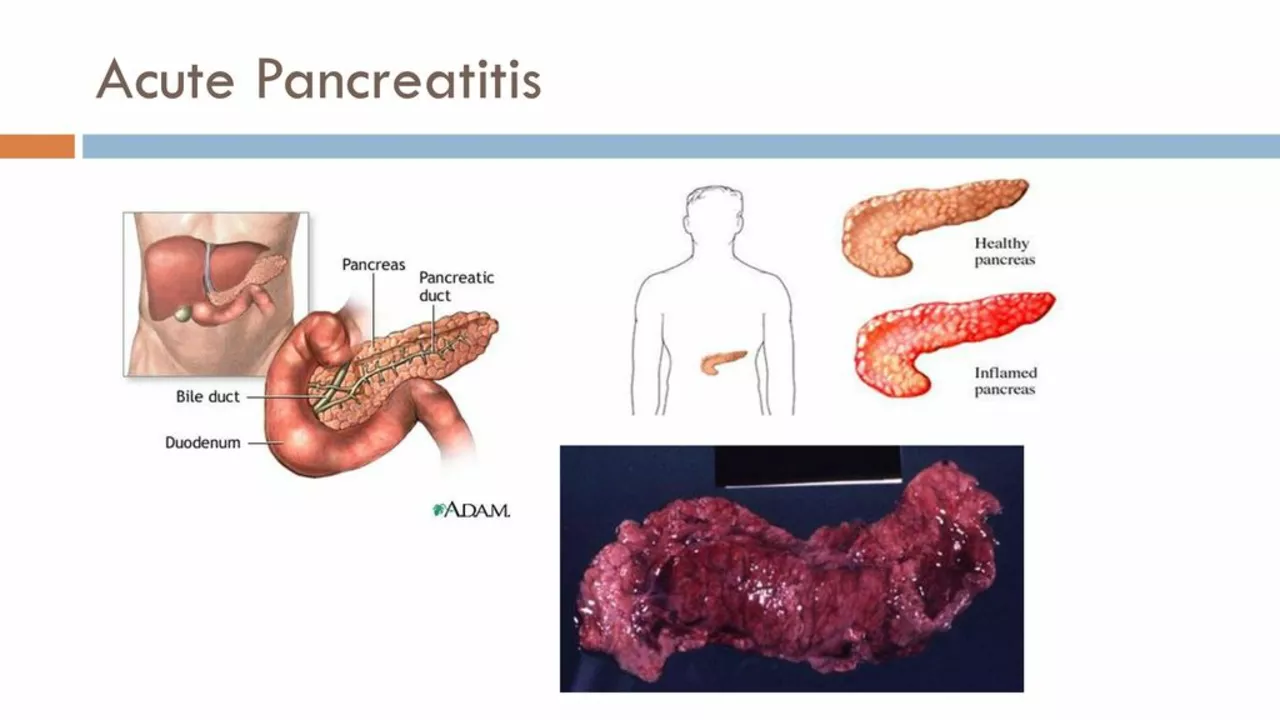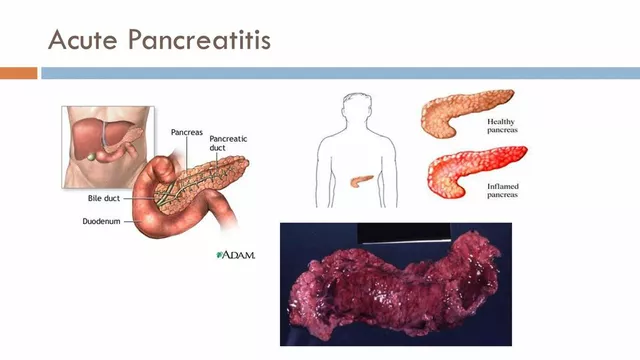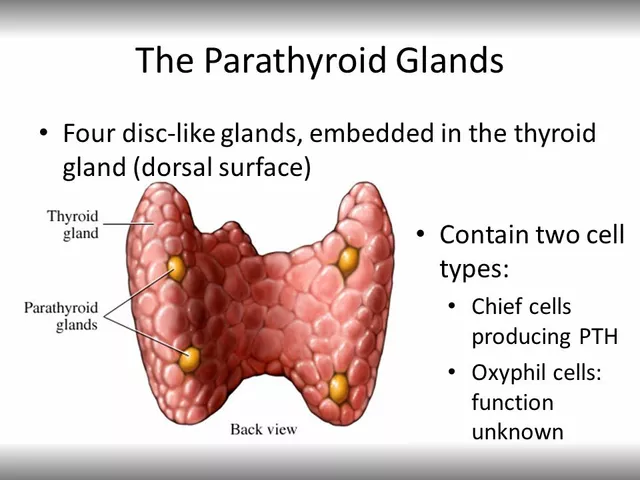Understanding Pancreatic Duct Blockage and Autoimmune Diseases
As a blogger, I am always on the lookout for intriguing and relevant health topics to share with my readers. Today, we will be exploring the connection between pancreatic duct blockage and autoimmune diseases. This is a topic that many people may not be aware of, and it's important to understand how these two conditions are related. So, let's dive in and learn about the fascinating connection between pancreatic duct blockage and autoimmune diseases.
The Role of the Pancreas in Digestion
Before we delve into the connection between pancreatic duct blockage and autoimmune diseases, it's essential to understand the role of the pancreas in digestion. The pancreas is a vital organ located behind the stomach that aids in the digestive process by releasing enzymes and hormones. These enzymes help break down the carbohydrates, proteins, and fats in our food, while the hormones regulate blood sugar levels.
When the pancreas is functioning properly, it produces enough enzymes and hormones to support a healthy digestive system. However, when there is a problem with the pancreas, such as a blockage in the pancreatic duct, it can lead to a host of issues, including autoimmune diseases. Let's explore this connection further in the following sections.
What is Pancreatic Duct Blockage?
Pancreatic duct blockage, also known as pancreatic duct obstruction, occurs when the duct that carries digestive enzymes and juices from the pancreas to the small intestine becomes blocked. This blockage can be caused by various factors, such as gallstones, inflammation, tumors, or scar tissue.
When the pancreatic duct is blocked, it can lead to a buildup of digestive enzymes in the pancreas. This can cause inflammation, pain, and damage to the pancreas, potentially leading to chronic pancreatitis or other complications, including autoimmune diseases. Let's look at how this connection works.
The Link between Pancreatic Duct Blockage and Autoimmune Diseases
The connection between pancreatic duct blockage and autoimmune diseases lies in the immune system's response to the blockage. When the pancreatic duct is blocked, the pancreas can become inflamed and damaged. This inflammation can cause the immune system to mistakenly attack the body's own tissues, leading to an autoimmune response.
There are several autoimmune diseases that have been linked to pancreatic duct blockage, including type 1 diabetes, autoimmune pancreatitis, and primary sclerosing cholangitis (PSC). In the next few sections, we will discuss these autoimmune diseases and how they relate to pancreatic duct blockage.
Type 1 Diabetes
Type 1 diabetes is an autoimmune disease that occurs when the immune system attacks and destroys the insulin-producing beta cells in the pancreas. Although the exact cause of type 1 diabetes is unknown, research has shown that pancreatic duct blockage can play a role in its development.
When the pancreatic duct is blocked, the pancreas can become inflamed and damaged, leading to a decrease in insulin production. This can cause blood sugar levels to rise, eventually leading to type 1 diabetes. While pancreatic duct blockage is not the only cause of type 1 diabetes, it is a potential contributing factor.
Autoimmune Pancreatitis
Autoimmune pancreatitis is a rare type of chronic pancreatitis that is caused by an autoimmune response. In this condition, the immune system attacks the pancreas, causing inflammation and damage. Pancreatic duct blockage has been linked to autoimmune pancreatitis, as the blockage can cause inflammation and damage to the pancreas, triggering an autoimmune response.
Autoimmune pancreatitis can be difficult to diagnose, as its symptoms are similar to those of other types of pancreatitis. However, if left untreated, autoimmune pancreatitis can lead to serious complications, such as diabetes and pancreatic cancer.
Primary Sclerosing Cholangitis (PSC)
Primary sclerosing cholangitis (PSC) is an autoimmune disease that affects the bile ducts, causing inflammation and scarring. Over time, this scarring can lead to blockages in the bile ducts, which can ultimately result in liver damage and cirrhosis. Although PSC primarily affects the bile ducts, it has also been linked to pancreatic duct blockage.
When the pancreatic duct is blocked, it can cause inflammation and damage to the pancreas, which can trigger an autoimmune response. This autoimmune response can then affect the bile ducts, leading to the development of PSC. While the exact cause of PSC is still unknown, pancreatic duct blockage is believed to be a contributing factor.
Conclusion
In conclusion, the connection between pancreatic duct blockage and autoimmune diseases is a fascinating and complex one. The blockage of the pancreatic duct can lead to inflammation and damage to the pancreas, which can then trigger an autoimmune response. This response can result in the development of various autoimmune diseases, such as type 1 diabetes, autoimmune pancreatitis, and primary sclerosing cholangitis.
As research continues to uncover more about this connection, it is crucial for individuals to be aware of the potential risks associated with pancreatic duct blockage and the importance of maintaining a healthy pancreas. By understanding the connection between pancreatic duct blockage and autoimmune diseases, we can better manage and prevent these conditions, leading to improved overall health and well-being.









Gary Fitsimmons
May 5, 2023 AT 09:20Never thought about how a clogged duct could trigger your body to attack itself
People need to know this
Bob Martin
May 5, 2023 AT 23:02Autoimmune pancreatitis is real but it's not caused by some duct getting clogged like a sink
It's a dysregulated immune response period
Sage Druce
May 6, 2023 AT 15:22But the link isn't just mechanical obstruction
It's the immune system getting confused after years of inflammation
Stop oversimplifying this
Tyler Mofield
May 7, 2023 AT 09:46It is imperative that clinicians recognize this potential etiological nexus
Bart Capoen
May 8, 2023 AT 05:41kinda like when you leave a guest too long and they start rearranging your stuff
then boom autoimmune
kendall miles
May 8, 2023 AT 19:47It's not just blockage
It's the glyphosate in your food and the 5G towers messing with your cellular signaling
They don't want you to know the pancreas is a bio-reactor for government mind control
Look up the CIA documents on pancreatic immune suppression
luna dream
May 9, 2023 AT 12:05It's your body screaming that you've been living out of alignment with cosmic truth
The pancreas is the center of your emotional digestion
When you swallow your anger instead of chewing it... it clogs
Linda Patterson
May 10, 2023 AT 06:06Other countries just don't understand how advanced our immune system is
Why are we even talking about this like it's some global mystery
It's a simple case of bad foreign diets and weak national health policy
Jen Taylor
May 10, 2023 AT 07:03It's like the pancreas is this quiet hero that gets ignored until it screams in autoimmune fire
And honestly? It's so under-discussed
People need to eat more colorful veggies, move their bodies, and stop treating their organs like disposable tools
Small daily choices matter more than we think
Patrick Dwyer
May 10, 2023 AT 09:08This initiates T-cell activation against pancreatic islet cells and ductal epithelium
It's not a myth - it's immunology in action